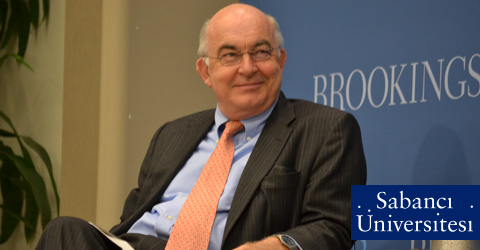15/11/2012
Kemal Derviş explains how Turkey can be among the top 10 economies globally in 2023 at the annual lecture in memory of Atatürk at the Turkish Embassy in Washington, D.C.
Kemal Derviş: “Long-term economic stability requires an environment of social and political peace.”

Kemal Derviş, Member of the Sabancı University International Board of Overseers and the Istanbul Policy Center Board of Directors and Vice President of the Brookings Institution, gave a lecture titled “Turkey on the Way to the 100th Anniversary of the Republic” at the Turkish Embassy in Washington, D.C. on Tuesday, November 13, 2012. Derviş’s speech was part of a succession of events that are traditionally organized around November 10 to observe the passing of Mustafa Kemal Atatürk.
Hosted by Ambassador Namık Tan and invited by Turkish-American Friendship Societies, Kemal Derviş spoke on the achievements of the Turkish Republic since its foundation, and discussed the path leading to the Republic’s centennial in 2023. Derviş underscored the need for a high level of investment adequately backed by domestic resources to ensure that the Republic and the democracy is confident of its future in 2023, and said that social peace and national unity were absolute requirements for rapid and sustainable growth based on investment and domestic savings.
Kemal Derviş asserted that a policy which intends peace, develops economic, cultural and political relations with other nations, and extends a helping hand to neighboring countries while avoiding to take sides in their internal conflicts would be beneficial from an economic perspective and uphold the legacy of Atatürk. Derviş added that a legal and political framework in which ethnic Kurds could maintain their own culture and identity in total peace as citizens of the Republic of Turkey had to be established as soon as possible without any type of violence and within the unity of Turkey as a nation. Derviş argued that such an environment of peace would only be possible when all terrorist acts subside and everyone strives to achieve their goals via strictly democratic means. Kemal Derviş said that both the debate surrounding secularism and new assertions regarding the Kurdish identity must build upon Atatürk’s always bold yet realistic, solution-oriented approach which embraced the circumstances of the time.
Kemal Derviş continued: “Successful democracy, however, is not just a ‘winner take all’ system, where those who win elections can do as they please. It has to include a system of checks and balances in a way that protects individual citizens, opposition groups, and whoever is in the minority. On the road to the hundredth anniversary of the Republic, Turkey now has the chance to show its citizens and the world that it has achieved what the founding fathers ultimately wanted, even though they did not practice it, namely that the country has become a full, normally functioning democracy.”
Kemal Derviş concluded by saying that long-term economic stability required an environment of social and political peace, and that Turkey would be much better positioned to achieve this goal as a strong member of Europe positioned globally yet, in any case, reinventing itself.

